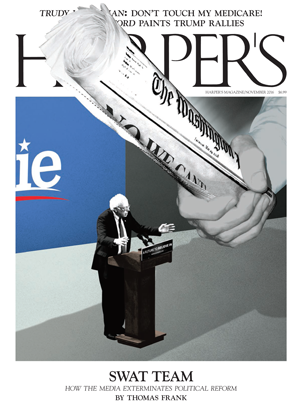Inside the November Issue
Thomas Frank on how the media exterminates political reform, Trudy Lieberman on the fate of Medicare, Chris Offutt on the changing face of Appalachia, a story by Stephen Dixon, and more
 Earlier this year, during the prolonged cage match of the Democratic primary, it became clear that much of the media viewed the candidacy of Bernie Sanders with amusement, irritation, and contempt. The caricature of the Vermont senator as a socialist Pied Piper, leading his flock of millennials straight over the electoral cliff, certainly contributed to his defeat. This we already know. But in this month’s cover story, “Swat Team,” Thomas Frank takes a deeper look at the phenomenon, using the Washington Post—arguably the house organ of the nation’s political class—as his test case. Frank read through some two hundred editorials and op-eds about Sanders, many of them almost comically derisive. (Sample headline: NOMINATING SANDERS WOULD BE INSANE.) His trawl through this material—a kind of Great Dismal Swamp of tongue-clucking rhetoric—is both amusing and instructive. But Frank has a bigger point to make about the media’s role in quashing reform, and its addiction to tiptoeing incrementalism as the only true path in American politics.
Earlier this year, during the prolonged cage match of the Democratic primary, it became clear that much of the media viewed the candidacy of Bernie Sanders with amusement, irritation, and contempt. The caricature of the Vermont senator as a socialist Pied Piper, leading his flock of millennials straight over the electoral cliff, certainly contributed to his defeat. This we already know. But in this month’s cover story, “Swat Team,” Thomas Frank takes a deeper look at the phenomenon, using the Washington Post—arguably the house organ of the nation’s political class—as his test case. Frank read through some two hundred editorials and op-eds about Sanders, many of them almost comically derisive. (Sample headline: NOMINATING SANDERS WOULD BE INSANE.) His trawl through this material—a kind of Great Dismal Swamp of tongue-clucking rhetoric—is both amusing and instructive. But Frank has a bigger point to make about the media’s role in quashing reform, and its addiction to tiptoeing incrementalism as the only true path in American politics.
By now, of course, the media has largely deserted the buffoonish figure of Donald Trump. But he still commands a sizable slice of the electorate, and has a demonstrated gift for bouncing back from self-inflicted catastrophe—he will remain a threat, and bigly, until Election Day. Chris Offutt, making his first appearance in the magazine, explores Trump’s appeal to white working-class voters in a meditative essay, “In the Hollow.” The author, himself a product of the Kentucky backwoods, has much to say about the role of pride—and its inverse, shame—in the Appalachian psyche. Meanwhile, artist Steve Mumford attends Trump rallies in Virginia and Maine, and captures their brassy, boisterous, Hillary-hating vibe in “Campaign Sketches.”
Farther from home, Jennifer Percy chronicles a seat-of-the-pants operation to rescue Christian hostages in “Escape from the Caliphate.” Her protagonist, a Good Samaritan named Emad Matti, knows exactly how to strike deals with the devil—in this case, Islamic State functionaries in Iraq. The ethical conundrum of bargaining with terrorists troubles him not one jot. The point is to extract as many hostages as possible and bring them to the safe harbor of Kirkuk, and Percy’s portrait of this embattled pragmatist, delicately negotiating for human lives via cell phone, is a keeper.
Elsewhere in the magazine, Trudy Lieberman describes how Medicare—one of those dastardly entitlements so hated by GOP grandees, and so loved by its actual beneficiaries—may succumb to the poison pill of privatization within just a few years. In Readings, Claire-Louise Bennett dilates on schnitzel and its discontents, Mark Morris tells us how to cry onstage, and Liana Finck plays the circle game in a series of witty drawings. William Deresiewicz reviews three books on the history of television and explains why, after decades of mediocrity, the medium has improved so drastically since the turn of the millennium. And finally, we have a story by Stephen Dixon, full of gentle regrets and long, head-spinning, heart-tickling sentences.


